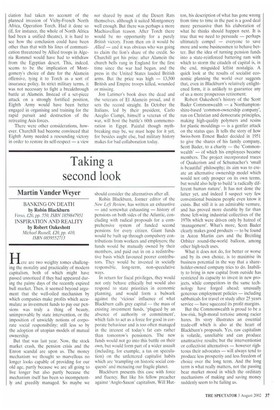Taking a second look
Martin Vander Weyer
BANKING ON DEATH by Robin Blackburn Verso, £20, pp. 550, ISBN 1859847951 INSPIRATION AND REALITY by Robert Oakeshott Michael Russell, .£20, pp. 410, ISBN 0859552713 Here are two weighty tomes challenging the morality and practicality of modern capitalism, both of which might have passed unnoticed if they had appeared during the palmy days of the recently expired bull market. Then, it seemed beyond argument that the well-oiled mechanism by which companies make profits which accumulate as investment funds to pay our pensions was truly a thing of beauty, unimprovable by state intervention, or the imposition of unwieldy notions of corporate social responsibility; still less so by the adoption of utopian models of mutual ownership.
But that was last year. Now, the stock market crash, the pension crisis and the Enron scandal are upon us. The money mechanism we thought so marvellous no longer looks capable of providing for our old age, partly because we are all going to live longer but also partly because the mechanism itself has been so incompetently and greedily managed. So maybe we should consider the alternatives after all.
Robin Blackburn, former editor of the New Left Review, has written an exhaustive — and somewhat exhausting — history of pensions on both sides of the Atlantic, concluding with radical proposals for a comprehensive system of funded second pensions for every citizen. Giant funds would be built up through compulsory contributions from workers and employers; the funds would be mutually owned by their members, and paid out in on a redistributive basis which favoured poorer contributors. They would be invested in socially responsible, long-term, non-speculative ways.
In return for fiscal privileges, they would not only behave ethically but would also respond to state priorities in economic planning, and would form a bulwark against the 'vicious' influence of what Blackburn calls grey capital — the mass of existing investment funds, 'plagued by an absence of authority or commitment', which fails to act as a force for good in corporate behaviour and is too often managed in the interest of today's fat cats rather than tomorrow's pensioners. The new funds would not go into this battle on their own, but would form part of a wider assault (including, for example, a tax on speculation) on the unfettered capitalist habits which are 'trampling on historic social conquests' and menacing our fragile planet.
Blackburn presents this case with force and fluency. But like his fellow preacher against 'Anglo-Saxon' capitalism, Will Hut
ton, his description of what has gone wrong from time to time in the past is a good deal more persuasive than his elaboration of what he thinks should happen next. It is true that we need to persuade — perhaps ultimately compel — everyone to save more and some businessmen to behave better. But the idea of turning pension funds into a state-reinforced battering ram with which to storm the citadels of capital is, in the end, misguided leftist nostalgia. A quick look at the results of socialist economic planning the world over suggests that, even in Blackburn's relatively enlightened form, it is unlikely to guarantee any of us a more prosperous retirement.
Robert Oakeshott's history of the Scott Bader Commonwealth — a Northamptonshire-based 'common-ownership company', run on Christian and democratic principles, making high-quality polymers and resins for plastic mouldings — is a gentler attack on the status quo. It tells the story of how Swiss-born Ernest Bader decided in 1951 to give the shares of his family company,
Scott Bader, to a charity the 'Commonwealth' — of which his employees became members. The project incorporated traces of Quakerism and of Schumacher's 'small is beautiful' philosophy; its aim was to create an alternative ownership model which would not only prosper on its own terms, but would also help to build 'a radically different human nature'. It has not done the latter yet, and indeed I suspect very few conventional business people even know it exists. But still it is an admirable venture, and has proved more durable by far than those left-wing industrial collectives of the 1970s which were driven only by hatred of 'management'. What's more, Scott Bader clearly makes good products — to be found in Aston Martin cars and the Breitling Orbiter round-the-world balloon, among other high-tech uses.
What it does not do, for better or worse and by its own choice, is to maximise its business potential in the way that a shareholder-owned company tries to do. Inability to bring in new capital from outside has restricted its capacity to invest in new projects, while competitors in the same technology have forged ahead; unusually generous employment policies — including sabbaticals for travel or study after 25 years service — have squeezed its profit margins.
But the Commonwealth is proud to be a low-risk, high-moral tortoise among racier hares. Its story illustrates an essential trade-off which is also at the heart of Blackburn's proposals. Yes, raw capitalism is volatile, unreliable and can produce unattractive results; but the interventionist or collectivist alternatives — however righteous their advocates — will always tend to produce less prosperity and less freedom of choice over the long term. And the long term is what really matters, not the passing bear market mood in which the ordinary mechanisms of making and saving money suddenly seem to be failing us.


























































 Previous page
Previous page